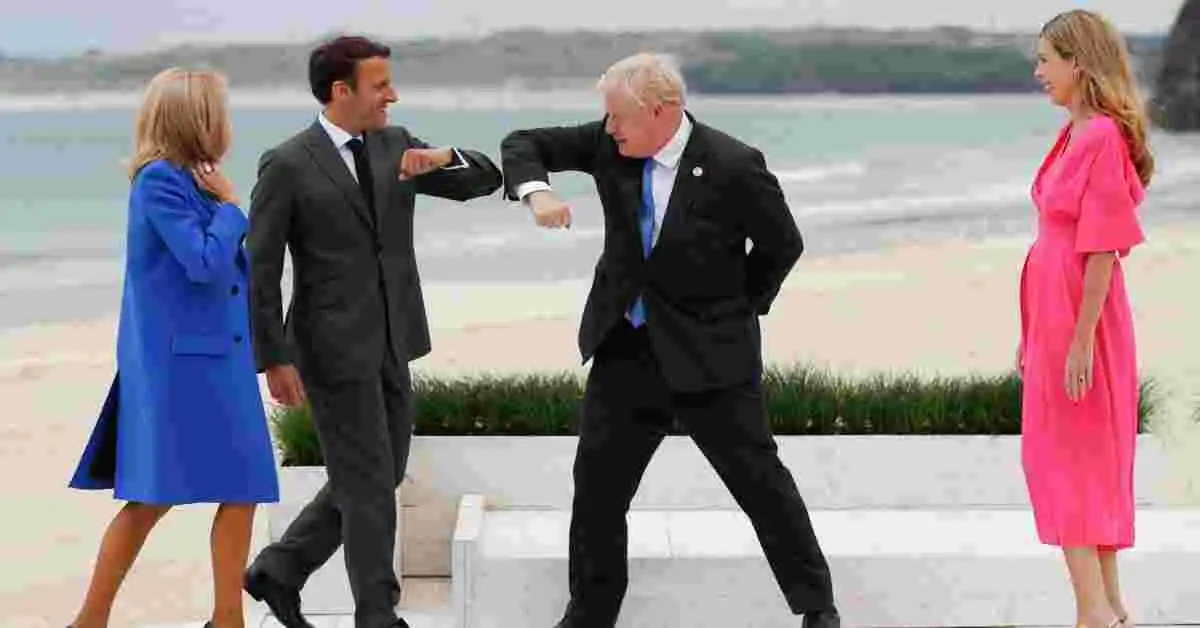
FALMOUTH, England – Summits can be as much about burying hatchets as making grand plans for the future. Here are some of the major — and ongoing — fights to keep an eye out for at the G7.
UK vs. France
There would be something amiss if we had a G7 summit without at least some U.K.-France animosity. Just as Boris Johnson fancied he may have calmed down the diplomatic row with Washington over Brexit afters in Northern Ireland, Emmanuel Macron popped back up again to say the idea of renegotiating the trade mechanism was “not serious.” And in a gesture of EU togetherness, he tweeted a photo of himself on arrival in Cornwall with Commission President Ursula von der Leyen, Council President Charles Michel, German Chancellor Angela Merkel and Italian Prime Minister Mario Draghi, saying: "As always, one same union, one same determination to act, one same enthusiasm! The G7 can begin." In an uncertain world, France’s tougher-than-the-rest pose on Brexit is at least reassuring in its constancy.
Likewise, Macron will not have endeared himself to the U.K. (not that he would want to) by suggesting that the G7 is trailing in France’s wake when it comes to vaccine diplomacy. Ahead of the summit, he threw down the gauntlet by expressing his support for waiving patents for vaccines . He tweeted: “From day one France has worked to make solutions to the pandemic a global public good … Dose sharing, opening up of intellectual property, financing of health systems. It's up to the G7 to get involved." The U.K., together with Germany, remains opposed to the waiver at the WTO.
US vs. EU
Brussels and Washington also fail to see eye-to-eye on waiving intellectual property rights tied to vaccines. Washington caused surprise across the Atlantic the previous month when the Biden administration said it would back the waiver discussions that are ongoing at the WTO. EU leaders reacted with skepticism, saying they had received no details of how the plan would work, or more importantly, get vaccines to poor countries any quicker — a red herring, in short.
But with Emmanuel Macron and the European Parliament throwing their support behind the idea in recent days, pressure will be building for a change of stance in Europe.
And while there have been positive signals on trade, there are still two big sources of tension between the U.S. and the EU: aircraft and steel. The first is the long-running Airbus/Boeing civil aircraft dispute that has resulted in politically sensitive goods such as Scotch whisky and Harley Davidson hit by tit-for-tat tariffs. The second is a Trump-era measure that treats steel imports from the EU and U.K. as a national security risk. Talks are ongoing on both fronts.
“The conversation is much less — when it comes to steel — concerning the bilateral relationship and the tariffs, and it's much more about what's the strategy with China,” said Chad Bown, a senior fellow at the Peterson Institute for International Economics.
South Korea vs. Japan
The two countries have a complicated history. After a court ruling in 2018, some of that history resurfaced, and ignited fresh rows. Tokyo signed a treaty in 1965 that restored diplomatic ties between both countries and provided loans and grants in order to fix its troubling colonial legacy in Seoul.
But the South Korean ruling in 2018 determined that Mitsubishi Heavy Industries Limited should pay reparations to families of workers who were used as forced labor during World War II, ramping up tensions. Then Japan curbed the export of sensitive materials used in technology manufacturing to South Korea. It's put extra pressure on strained global supply chains.
If that wasn’t enough to get on with, there’s also a territorial dispute between both nations that’s getting more attention due to an Olympic map.
Germany vs. US
The construction of a pipeline that aims to bring Russian gas to Germany has been a long-standing source of anger in the U.S. Both Republican and Democrat administrations have regarded the Nord Stream 2 project as undermining security in the region and therefore commitments made by Germany as a member of NATO.
Still, there’s been a shift since Joe Biden took the helm. a news outlet reported that the U.S. plans to waive sanctions against an ally of Russian President Vladimir Putin who heads the company that is building the pipeline. But there may still be some tensions to come.
The State Department said the previous month: “The Biden Administration has been clear that the Nord Stream 2 pipeline is a Russian geopolitical project … We continue to examine entities involved in potentially sanctionable activity and have made it clear that companies risk sanctions if they are involved in Nord Stream 2.”
Japan vs. UK
No doubt there are those for whom Tory Britain still conjures up images of tally-ho toffs riding through the countryside, but Boris Johnson’s Conservatives have been on something of a journey when it comes to animal welfare. This is down, in no small part, to Johnson’s wife Carrie — formerly communications director for the party.
An animal lover, she helped spark a Conservative rebrand, embracing the “conservation” part of their members’ instincts and presenting Britain as newly protective of wildlife and livestock after Brexit (please apply your own healthy dose of skepticism here). In that spirit, Johnson had some strong words for Japan on whaling back in January which may not be easily washed over.
And one more thing ...
England vs. Boris
The biggest row of all is actually bound to be Johnson's decision to schedule his major G7 press conference so that it clashes with England's Euro 2020 football match against Croatia.